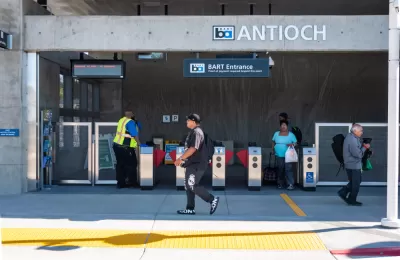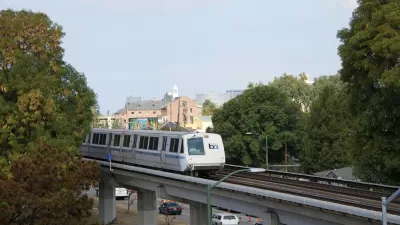Amidst fierce opposition from East Bay cities who want to control the destiny of BART parking lots in their jurisdictions, Assembly Bill 2923, which would partially preempt local land use authority, passed a critical committee last Thursday.

Assemblyman David Chiu (D-San Francisco) and his co-sponsor, Concord Democratic Assemblyman Timothy Grayson, envision BART parking lots as being more than broad swaths of asphalt to store commuters' private vehicles during the day while remaining largely vacant at night. Instead, they see these lots as a resource to address both the housing crisis and regional traffic congestion if replaced by modern transit-oriented developments.
While not nearly as high-profile as another bill this year that would have preempted local land use authority on a much broader and deeper level, SB 827: transit-rich housing bonus by Sen. Scott Wiener (D-San Francisco), Assembly Bill 2923 has generated significant controversy in the East Bay.
"Though others share [Chiu's and Grayson's] vision, development of BART parking lots is a contentious issue: Bickering over height limits, aesthetics and parking spaces has long hobbled the transit agency’s ability to get it done," reports Rachel Swan for the San Francisco Chronicle on Wednesday, Aug. 15.
Fierce opposition from mayors, city councils and neighborhood groups has cast the future of Assembly Bill 2923 in doubt as it faces a live-or-die vote in a state Senate fiscal committee Thursday.
The contentious bill passed the critical Senate Appropriations Committee on a 5-2 vote and now heads to the full Senate Floor. The Assembly barely passed AB 2923, with only one vote to spare, on May 31.
Swan explains the resistance.
“I think everybody agrees that we need to have more housing in the Bay Area,” said Orinda Mayor Amy Worth. “Our issue is with BART having land-use authority over cities.”
Throughout Alameda and Contra Costa counties, the arguments are similar. Nearly everyone seems to agree on the virtues of transit-oriented development, which would add vital housing stock and ease pressure on jammed freeways. Yet many cities want to fill this land on their own time and their own terms, without BART or state legislators calling the shots.
It's not just city leaders that have a problem with the bill; so does the 9-member BART Board of Directors which has taken a neutral position, adds Swan.
Nick Josefowitz, who represents San Francisco [and is a candidate for Supervisor], helped craft the bill and remains a vocal supporter. Three other board directors — Debora Allen, John McPartland and Thomas Blalock — wrote a letter in dissent, saying BART’s job is “transit, not housing.”
Swan goes into detail on local opposition to development at parking lots of the Ashby and North Berkeley stations.
See three additional posts on this legislation under legislative tag AB 2923.
FULL STORY: Housing on BART land has been a third-rail issue. Will this effort be different?

Alabama: Trump Terminates Settlements for Black Communities Harmed By Raw Sewage
Trump deemed the landmark civil rights agreement “illegal DEI and environmental justice policy.”

Study: Maui’s Plan to Convert Vacation Rentals to Long-Term Housing Could Cause Nearly $1 Billion Economic Loss
The plan would reduce visitor accommodation by 25% resulting in 1,900 jobs lost.

Planetizen Federal Action Tracker
A weekly monitor of how Trump’s orders and actions are impacting planners and planning in America.

Wind Energy on the Rise Despite Federal Policy Reversal
The Trump administration is revoking federal support for renewable energy, but demand for new projects continues unabated.

Passengers Flock to Caltrain After Electrification
The new electric trains are running faster and more reliably, leading to strong ridership growth on the Bay Area rail system.

Texas Churches Rally Behind ‘Yes in God’s Back Yard’ Legislation
Religious leaders want the state to reduce zoning regulations to streamline leasing church-owned land to housing developers.
Urban Design for Planners 1: Software Tools
This six-course series explores essential urban design concepts using open source software and equips planners with the tools they need to participate fully in the urban design process.
Planning for Universal Design
Learn the tools for implementing Universal Design in planning regulations.
Caltrans
Smith Gee Studio
Institute for Housing and Urban Development Studies (IHS)
City of Grandview
Harvard GSD Executive Education
Toledo-Lucas County Plan Commissions
Salt Lake City
NYU Wagner Graduate School of Public Service





























